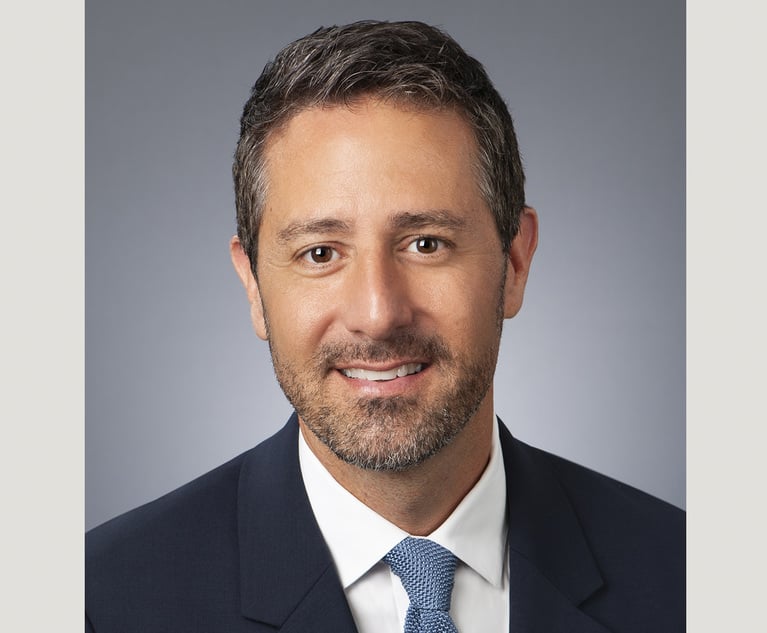UnitedLex's Deal With LeClairRyan Was a Failure. Is It Also a Sign of Things to Come?
After UnitedLex's first law firm partnership fell apart, Big Law and New Law still have a future together.
September 06, 2019 at 10:11 AM
6 minute read
 Daniel Reed, chief executive officer, United Lex. (Photo: David Handschuh/ALM)
Daniel Reed, chief executive officer, United Lex. (Photo: David Handschuh/ALM)
When UnitedLex announced the creation of a "strategic business platform" with LeClairRyan in May 2018, company founder Dan Reed was not shy about his aims for the joint venture, dubbed ULX Partners.
"If we don't reach 10,000 employees in the next five years, then I'm not doing something right," he told The American Lawyer. "Some people would view that as heretical, but it's not."
With LeClairRyan's collapse only a year later, and the future of ULX Partners in doubt, "heretical" seems like an understatement. But several industry observers said law firm leaders shouldn't walk away with the wrong lessons—and they shouldn't shy away from the opportunities being offered by UnitedLex and other New Law outfits.
ULX hired more than 300 administrative and legal support professionals from LeClairRyan, taking over back-office and support staff services, before the law firm finally gave up hope for a rebound in August. An undisclosed number of ULX employees are now overseeing LeClairRyan's wind-down efforts, according to a filing in the firm's bankruptcy. The remaining LeClairRyan employees—fewer then 10, per the filing—will soon be working out of office space leased by ULX.
Amid the troubles at LeClairRyan, Reed and UnitedLex have been tight-lipped about what the future holds for ULX, and the entity—an LLC registered in Delaware—lacks a public-facing web presence. A spokeswoman for UnitedLex has repeatedly declined to comment on questions about the future of ULX, pointing to its previous client relationship with LeClairRyan.
From the start, Reed said the goal was to enlist a growing number of law firms as partners; like LeClairRyan, these firms would be granted minority equity stakes in the venture and rely upon it for their legal support functions—including HR, IT, knowledge management, pricing and procuring. The purported benefit for firms: superior services at lower costs.
But after public comments that it had been approached by several U.K. firms about joining the platform, it's unclear whether any firms in the U.S. or the U.K. have followed LeClairRyan's lead. At the moment, 10,000 employees seems a long way off.
Consultant Marcie Borgal Shunk of the Tilt Institute said that shouldn't spook the industry. In fact, she said LeClairRyan's experience should be a reminder of the opportunities that new arrangements can offer firms that aren't at the height of the law firm market.
"They should be thinking about this sooner rather than later," she said. "There's a potential opportunity to pursue work and find work that would otherwise be outside the realm of possibility. It allows them to compete with the big guys."
Several former partners at LeClairRyan said they did not believe the arrangement with ULX had any impact on the firm's collapse. One noted that he'd brought in several new clients via UnitedLex that are moving with him to his new firm.
While the bankruptcy filing shows that LeClairRyan owes ULX Partners $8 million plus interest, on the face of it, that number says little. The firm estimated between $10 million and $50 million in remaining assets, and wherever the actual number falls within those parameters, it might have been significantly lower, had the firm been paying directly for these services over the past year.
"I don't think that there's evidence that the deal with UnitedLex was a driver in LeClairRyan's demise, and in fact, I think it was a net positive in keeping their expenses down," said Kent Zimmermann, a consultant with the Zeughauser Group.
'Someone Is Eventually Going to Do It'
Ultimately, the competitive pressures pushing traditional firms to enter into novel arrangements with New Law competitors aren't going anywhere. Clients fight back on rates, and demand will suffer in the event of a recession, all while salaries creep upward.
"Getting growth at law firms is just a difficult job. It's very challenging," said Howard Rosenberg, the former chief operating officer at Baker McKenzie's Washington, D.C., office and now the co-founder and CEO of Decipher, a lateral hiring competitive intelligence firm.
"It's a solid idea for the marketplace," he added. "I think that somebody is eventually going to do it."
That someone could be UnitedLex or another player in the alternative legal services world. According to consultants Bruce MacEwan and Janet Stanton at Adam Smith, Esq., while some leaders remain risk-averse, to the detriment of their firms, other forward-looking leaders will continue to experiment with a range of combinations with alternative providers, from joint ventures to buying and renting each other's services, to long-term and short-term exclusive and non-exclusive alliances.
"This is exactly—and rightly in our view—what happens with emerging market dynamics," they said in an email, likening the experimentation to the auto industry, where traditional manufacturers and tech upstarts are dabbling with a range of technologies, including driverless and electric vehicles as well as cleaner permutations of the traditional internal combustion engine.
Some of the legal industry efforts are being spearheaded on the law firm side, like Greenberg Traurig's "Recurve" subsidiary, which aims to guide legal departments and other law firms on how to add auxiliary services, like legal tech, staffing and real estate guidance. These service providers may also be investors in Recurve.
"Many of these trial dating/live-together/marriage arrangements will endure, and many others will fail or simply run their course, but in the process the industry as a whole will get smarter about what the market wants and what the better and worse delivery models look like," Stanton and MacEwan added.
And while UnitedLex and LeClairRyan made a splash when they announced their joint venture, Shunk suspects that there are more of these relationships going on in the background than the public knows about. Beyond seeking the limelight, there's no compelling reason to be overly public.
"When you think about other industries, where they join forces along the supply chain, it's not something they announce publicly," she said.
That might also explain why UnitedLex has been unwilling to answer questions about other law firm partners.
Still, in a world where only one law firm, Dentons, can count over 10,000 lawyers—and that thanks to a sui generis growth strategy—achieving the same number of employees for a New-Law startup still feels like a distant goal .
"For the first joint venture to do this, I think 10,000 is asking for a lot," Rosenberg said.
Read More
How LeClairRyan's Grand Plans Unraveled
Rivals Scoop Up LeClairRyan Lawyers as Clock Ticks on Dissolution, Insurance Coverage
This content has been archived. It is available through our partners, LexisNexis® and Bloomberg Law.
To view this content, please continue to their sites.
Not a Lexis Subscriber?
Subscribe Now
Not a Bloomberg Law Subscriber?
Subscribe Now
NOT FOR REPRINT
© 2025 ALM Global, LLC, All Rights Reserved. Request academic re-use from www.copyright.com. All other uses, submit a request to [email protected]. For more information visit Asset & Logo Licensing.
You Might Like
View All
'Ridiculously Busy': Several Law Firms Position Themselves as Go-To Experts on Trump’s Executive Orders
5 minute read
Holland & Knight Hires Former Davis Wright Tremaine Managing Partner in Seattle
3 minute read
Am Law 200 Firms Announce Wave of D.C. Hires in White-Collar, Antitrust, Litigation Practices
3 minute read
Paul Hastings Hires Music Industry Practice Chair From Willkie in Los Angeles
Trending Stories
- 1Data Disposition—Conquering the Seemingly Unscalable Mountain
- 2Who Are the Judges Assigned to Challenges to Trump’s Birthright Citizenship Order?
- 3Litigators of the Week: A Directed Verdict Win for Cisco in a West Texas Patent Case
- 4Litigator of the Week Runners-Up and Shout-Outs
- 5Womble Bond Becomes First Firm in UK to Roll Out AI Tool Firmwide
Who Got The Work
J. Brugh Lower of Gibbons has entered an appearance for industrial equipment supplier Devco Corporation in a pending trademark infringement lawsuit. The suit, accusing the defendant of selling knock-off Graco products, was filed Dec. 18 in New Jersey District Court by Rivkin Radler on behalf of Graco Inc. and Graco Minnesota. The case, assigned to U.S. District Judge Zahid N. Quraishi, is 3:24-cv-11294, Graco Inc. et al v. Devco Corporation.
Who Got The Work
Rebecca Maller-Stein and Kent A. Yalowitz of Arnold & Porter Kaye Scholer have entered their appearances for Hanaco Venture Capital and its executives, Lior Prosor and David Frankel, in a pending securities lawsuit. The action, filed on Dec. 24 in New York Southern District Court by Zell, Aron & Co. on behalf of Goldeneye Advisors, accuses the defendants of negligently and fraudulently managing the plaintiff's $1 million investment. The case, assigned to U.S. District Judge Vernon S. Broderick, is 1:24-cv-09918, Goldeneye Advisors, LLC v. Hanaco Venture Capital, Ltd. et al.
Who Got The Work
Attorneys from A&O Shearman has stepped in as defense counsel for Toronto-Dominion Bank and other defendants in a pending securities class action. The suit, filed Dec. 11 in New York Southern District Court by Bleichmar Fonti & Auld, accuses the defendants of concealing the bank's 'pervasive' deficiencies in regards to its compliance with the Bank Secrecy Act and the quality of its anti-money laundering controls. The case, assigned to U.S. District Judge Arun Subramanian, is 1:24-cv-09445, Gonzalez v. The Toronto-Dominion Bank et al.
Who Got The Work
Crown Castle International, a Pennsylvania company providing shared communications infrastructure, has turned to Luke D. Wolf of Gordon Rees Scully Mansukhani to fend off a pending breach-of-contract lawsuit. The court action, filed Nov. 25 in Michigan Eastern District Court by Hooper Hathaway PC on behalf of The Town Residences LLC, accuses Crown Castle of failing to transfer approximately $30,000 in utility payments from T-Mobile in breach of a roof-top lease and assignment agreement. The case, assigned to U.S. District Judge Susan K. Declercq, is 2:24-cv-13131, The Town Residences LLC v. T-Mobile US, Inc. et al.
Who Got The Work
Wilfred P. Coronato and Daniel M. Schwartz of McCarter & English have stepped in as defense counsel to Electrolux Home Products Inc. in a pending product liability lawsuit. The court action, filed Nov. 26 in New York Eastern District Court by Poulos Lopiccolo PC and Nagel Rice LLP on behalf of David Stern, alleges that the defendant's refrigerators’ drawers and shelving repeatedly break and fall apart within months after purchase. The case, assigned to U.S. District Judge Joan M. Azrack, is 2:24-cv-08204, Stern v. Electrolux Home Products, Inc.
Featured Firms
Law Offices of Gary Martin Hays & Associates, P.C.
(470) 294-1674
Law Offices of Mark E. Salomone
(857) 444-6468
Smith & Hassler
(713) 739-1250










